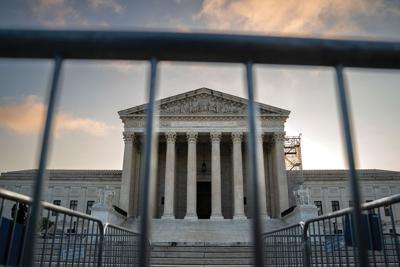Several of Tennessee’s state legislators have sought to make a splash on the national level when it comes to limiting access to gender-affirming care for transgender youth — and they’ve succeeded. Arguments over Tennessee legislation banning trans health care will be heard by the U.S. Supreme Court in December.
One such legislator is state Senate Majority Leader Jack Johnson (R-Franklin). After promising action at an anti-trans rally led by conservative media outlet Daily Wire, Johnson co-sponsored the ban as the first bill of 2023’s legislative session. He was successful in passing the law, and Tennessee Attorney General Jonathan Skrmetti was successful in arguing that the law should go into effect, despite legal back-and-forth in lower courts.
Tennessee was the third state in the country to enact a law banning gender-affirming care for people younger than 18, including hormone therapy, puberty blockers and surgery. (Alabama’s law is still under litigation, and Arkansas’ law was blocked.) Johnson recently told Scene sister publication the Williamson Scene he is happy to see his law reach the Supreme Court level.
NYC attorney will represent local family and others, become first transgender lawyer to appear before highest court
“I’m just grateful to the Supreme Court for being willing to take it up,” Johnson says. “It is a very important issue. People are very passionate about it. … I’m honored as the sponsor of the legislation that’s going to be the test case, the bill that’s going to be the one that’s argued.”
On the plaintiffs’ side — which includes the American Civil Liberties Union of Tennessee, a Memphis doctor, a New York legal firm, a Nashville family and others — is the U.S. Department of Justice, which will be arguing against the law during oral arguments set for Dec. 4. The ACLU of Tennessee will be arguing, on behalf of the private plaintiffs, that the law violates the equal protection clause of the U.S. Constitution because it discriminates based on sex and unfairly targets one group: transgender teens. (The ACLU of Kentucky also brought a challenge to their state's similar ban, and it was combined with U.S. v. Skrmetti.)
“It’s rare for any law to be heard at the Supreme Court,” says Lucas Cameron-Vaughn, staff attorney at ACLU of Tennessee “This law is, we believe, so harmful and so egregious that it required us asking the U.S. Supreme Court to step in.
Cameron-Vaughn continues: “ACLU’s task is to stand with our clients, on behalf of our clients, these brave families and young people who are having their rights violated, and to stand before the U.S. Supreme Court and say, ‘This is discrimination based on sex, it violates our rights under the Constitution, we are entitled to equal protection of the laws, and this law impermissibly discriminates against us, and it should be struck down.’”
In recent years, the Tennessee General Assembly passed a law requiring transgender children to play school sports based on the gender listed on their birth certificate, along with another protecting teachers who don’t use students’ preferred pronouns.
“Tennessee, unfortunately, has become somewhat of a national leader in passing these kinds of anti-trans laws aimed at people under 18,” Cameron-Vaughn says.
Tennessee is also leading the nation in abortion restrictions.
The U.S. Supreme Court was also set to hear Moyle v. United States and Idaho v. United States, both of which claimed that Idaho’s abortion ban (which resembles Tennessee’s) conflicts with the Emergency Medical Treatment and Labor Act — federal legislation that requires emergency medical treatment. According to ACLU of Tennessee legal director Stella Yarbrough, the cases were dismissed, in short, because the law is still evolving.
Judge gives temporary injunction, citing infringement of free speech
“The takeaway for Tennessee would be that there really isn’t that much precedent at all in the Idaho case,” says Yarbrough, “and that these issues are still very much live issues, and that this court kind of jumped the gun and got involved a little bit too quickly and is now taking a step back and letting the lower courts figure it out.”
Meanwhile, some of Tennessee’s lower courts are, in fact, trying to figure it out. Earlier this month, the Davidson County Chancery Court ruled that doctors should be able to provide abortions during a few more specific medical emergencies without punishment. That case, Blackmon v. State of Tennessee, included Idaho plaintiffs. Enforcement of Tennessee’s “abortion trafficking” law (which also resembles one in Idaho) was temporarily blocked while undergoing litigation as well.
“Even when Roe was still the law of the land, we have a long history of making abortion really difficult to access, and so in some ways, Tennessee continues to uphold that tradition of making access to abortion really impossible for people,” says Yarbrough. “I think that the efforts to control access across state lines for minors is keeping with that tradition and could indicate a trend of what’s to come.”
Additional reporting by Hamilton Matthew Masters.







